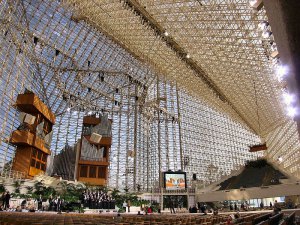"Flat, Dull Evangelicalism"

November 11, 2010

It is no longer a new story that the Crystal Cathedral has filed for bankruptcy. What does this tell us about religion in the US, particularly evangelicalism?
Check out this devastating article.
Check out this devastating article.
In the US, where school psychologists are almost as common as school nurses, we are obsessed with talk therapies because they are in fact ecumenical and secularised versions of evangelical Christianity, our old time religion. Twelve-step programmes, beginning with Alcoholics Anonymous, appropriated the conversion scenario of revivalism, eliminating references to Jesus in favour of appeals to a generic "higher power". Later self-help programmes and therapies dispensed with supernatural intermediaries altogether. Learning the right tricks and gimmicks, thinking the right thoughts and acquiring the proper attitudes would directly, by a law of nature, make good things happen for you.
Schuller, Warren and other new-style evangelical preachers, who focus on this-worldly improvement rather than otherworldly salvation, have not sold out Christianity in favour of secular self-help. They have simply reappropriated those bits of evangelical Christianity that cycled through the secularisation process and emerged as therapies, having in the process acquired the veneer of science.
So if you wonder why Americans are, anomalously, religious it is because we have evacuated religion of all content. There are of course theological doctrines on the books, which church members tick off, in the way that they agree to accept screenfuls of conditions for installing new software. But most have no serious interest in these theoretical matters. Whether signing on for a new therapy or self-help programme, trying out a new diet or a new church, they are looking for a bag of tricks, a collection of gimmicks and recipes that will get them the material prosperity, perfect health, beautiful bodies, ideal relationships and complete happiness to which they believe they are entitled.
I never understood the appeal of these programmes, whether religious or secular: they claimed to produce plain empirical results but were never empirically confirmed. For all the cheerful platitudes and possibility thinking, the Crystal Cathedral was bankrupt.
Beyond that, as a religious believer I was disheartened. Was this all religion was: Cheerful platitudes and advice for successful living? Recipes for doing well in this world and the next? A pleasant place to pass an hour or two: an uplifting programme, brunch in the Welcoming Center and a stroll through the grounds?
I thought religion was a window into heaven, into another world of power, glory and intensity, to the contemplation of divine beauty. When I got religion, I never imagined this flat, dull evangelicalism.




